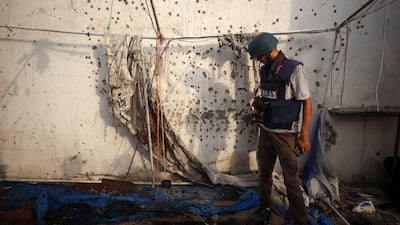The sound of bullets zigzagging between my feet and vanishing into the sand was almost mesmerising. It didn’t feel real, not until an armed man shouted at me to take cover.
I ducked behind a car, alone. A van barely three metres away was packed with journalists. One bodyguard stood by the door, yelling for me to run to them. I sprinted through the open space, bullets ringing in my ears. Those were the longest two seconds of my life.
Libya 2011 was the most brutal experience I’d known as a journalist. Then came Gaza.
I’ve never been to Gaza. Since the war began, I’ve been guiding coverage from the newsroom. But, as ashamed as I am to admit this, compared with what others endure there, every day felt like another Libya: a sprint between reality and death, trying to make sense of how mass killing could become routine, how impunity could become normal.
No matter what we produced, how many stories or headlines, it never felt enough. It wasn’t enough to capture the scale of injustice on the ground. That realisation, that our words had limits, has haunted me for 24 months.
When the ceasefire was announced on Friday, my mind went instantly to the journalists who were killed covering this war. Fathers. Mothers. People who risked everything just to tell the truth and were killed by Israeli fire. I saw videos of journalists announcing the end of the war as they walked through the darkened streets of Gaza, their voices trembling between disbelief and exhaustion. Others held up photos of colleagues they had lost. It stirred a strange, exhausting mix of emotions in me: guilt that I wasn’t there, relief that the killing had finally paused, and anger that no one would ever be held accountable.
One of the most terrifying moments in the past two years came when my colleague on the ground, Nagham Mohanna, went silent after her area was bombed. She disappeared for hours. We called every contact we had in Gaza, desperate for any sign she was alive. When we finally heard she was safe, the relief was overwhelming.
Nagham, a mother of two, decided soon after to leave Gaza. She walked for several kilometres with her children and a few belongings, crossing into Egypt and then to a country where she didn’t speak the language and knew no one. I hadn’t met her yet. I knew her only from a photo, and her voice from our WhatsApp messages: calm, guiding her children as they walked under Israeli fire. I kept imagining the scene, drawing on the wire photos I’d seen of other mothers on that same path.
At the desk, there’s another kind of struggle, asking colleagues to write about Gaza, scrolling through photo after photo of bodies, ruins and grief, trying to choose one image that tells the story. It reminded me of 2006, when I worked at a newspaper in Beirut during another Gaza war. One night, I went to check if the editor handling the Gaza story had finished. I found him crying, scrolling through wire photos. He stopped at a picture of a mother killed with her three children at their doorstep, their bodies tangled together after an Israeli strike. He couldn’t move on. I had to step in and push him to keep going. He did, every day, through tears, until the war ended with the same outcome. Just like this one.
Israel’s war in Gaza has dragged on for two years, but something in me shifted exactly nine months ago, when I found out I was going to be a father. My years covering war zones, especially in Iraq, had already changed me. They brought me close to people, and somehow made me calmer, more patient, more adaptable. But this time, Gaza felt different. Covering this war while knowing I was about to raise a child in this world created something new in me, something I still can’t name. It reminded me of when grief first hit me four years ago and never really left. Like seeing a new colour for the first time.
Today, there’s a ceasefire. And in two weeks, I’ll be a father. That thought brings me hope that maybe this ceasefire will hold, so one day I can tell my daughter she was born at a time of peace. And maybe, just maybe, I can take her to Gaza, to see the olive trees, to meet the warm Palestinians of that generous land, and to swim in the now off-limits sea.
I don’t know if I’ll still be a journalist then. But I know I won’t be going there to report. I’ll be going so she can believe that beauty can still grow from a place that has seen so much pain.
And to meet one of her father’s heroes: Nagham, and her kids.


